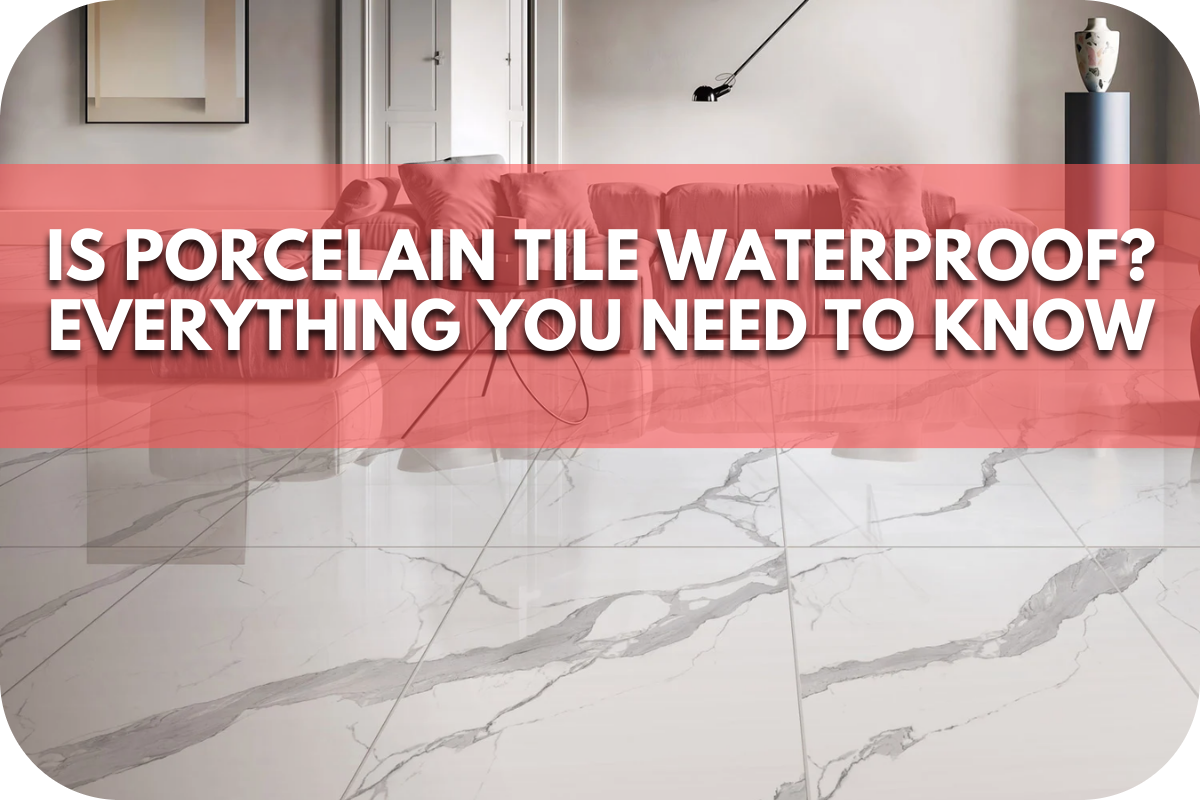
Struggling to find a tile that withstands constant moisture and heavy use?
Many tiles absorb water, leading to mould, mildew, and costly damage. Inadequate waterproofing can compromise both appearance and functionality, causing frustration and expense.
Discover why porcelain tile is the ultimate waterproof option. Porcelain tile is perfect for any wet area with its low absorption rate, unmatched durability, and easy maintenance. Read on to learn everything you need to know about its waterproof properties.
Is Porcelain Tile Waterproof? Everything You Need to Know
Porcelain tile is highly waterproof due to its low water absorption rate of 0.5% or less. This makes it ideal for wet areas such as bathrooms, kitchens, and outdoor spaces. Its durability, density, and ease of maintenance further enhance its suitability for environments exposed to moisture.
What is Porcelain Tile?
Porcelain tile, a premium ceramic tile, stands out due to its exceptional durability and water resistance. Made from a fine blend of clays and minerals, porcelain is fired at extremely high temperatures, ranging between 1200°C and 1400°C.
This process creates a dense, vitrified material highly impervious to water, making it an ideal choice for indoor and outdoor applications.
The composition of porcelain tile includes kaolin clay, feldspar, silica, and other natural materials, which are finely ground and mixed to achieve uniform consistency. This mixture is then pressed into shape and subjected to intense heat, resulting in a tile with very low porosity and high strength.
Porcelain tiles come in various finishes, including glazed and unglazed, polished and matte, and are available in various colours and patterns.
This versatility allows for creative design possibilities while ensuring the tiles can withstand heavy foot traffic, exposure to moisture, and daily wear and tear.
Whether used in bathrooms, kitchens, or outdoor patios, porcelain tile offers a blend of aesthetic appeal and practical functionality.
Waterproof Properties of Porcelain Tile
Porcelain tile is renowned for its superior waterproof properties, making it an ideal choice for areas exposed to moisture. With an exceptionally low water absorption rate of 0.5% or less, porcelain tiles are highly resistant to water penetration.
This impressive feature is primarily due to the high-temperature firing process that vitrifies the clay, resulting in a dense, non-porous surface.
Unlike many other materials, porcelain tiles do not require additional waterproofing treatments. Their inherent density and hardness prevent water from seeping through, reducing the risk of mould, mildew, and water damage.
This makes porcelain tiles suitable for bathrooms, kitchens, and outdoor spaces with high moisture levels.
Additionally, many porcelain tiles have a glazed surface, which adds extra protection against water and stains. Even unglazed porcelain tiles retain their water-resistant properties due to their compact structure.
This combination of natural waterproofing and optional glazing ensures that porcelain tiles remain durable and easy to maintain, providing both practical and aesthetic benefits in wet environments.
Porcelain Tile vs. Other Tile Materials
When choosing tile materials, porcelain tiles offer distinct advantages over other options. Compared to ceramic tiles, porcelain has a significantly lower water absorption rate of 0.5% or less, making it much more resistant to water and moisture. This feature is crucial for areas like bathrooms and kitchens, where water exposure is frequent.
Porcelain tiles are denser and more durable than ceramic tiles, making them less prone to cracking and chipping. This durability extends their lifespan, even in high-traffic areas. In contrast, with their higher porosity, ceramic tiles are more susceptible to water damage and wear over time.
Natural stone tiles, such as marble and granite, offer a unique aesthetic but often require sealing to prevent water penetration. Porcelain, however, does not require much maintenance, providing a hassle-free solution with similar visual appeal, especially with designs that mimic natural stone.
While nearly impervious to water, glass tiles are more fragile and better suited for decorative applications than high-traffic flooring. Porcelain combines durability, water resistance, and aesthetic versatility, making it the superior choice for various applications.
Applications of Porcelain Tile in Wet Areas
Porcelain tiles excel in wet areas due to their exceptional waterproof properties and durability. In bathrooms, both on floors and walls, porcelain tiles provide a practical and stylish solution that withstands daily exposure to water and humidity. Their slip-resistant surfaces enhance safety, especially in shower areas.
In kitchens, porcelain tiles are ideal for backsplashes and countertops, where spills and splashes occur daily. Their resistance to staining and heat makes them suitable for practical and aesthetic purposes.
Porcelain tiles are resistant to frost, UV rays, and heavy foot traffic, making them ideal for outdoor spaces such as patios and pool surrounds.
Wet rooms, designed to handle water from showers and baths, benefit significantly from porcelain tiles’ waterproof nature. Porcelain creates a seamless, waterproof, practical, and visually appealing environment when used from floor to ceiling.
Commercial settings like public restrooms and restaurant kitchens also benefit from porcelain tiles’ durability and hygiene properties, ensuring long-lasting performance in high-moisture environments.
Factors Affecting Porcelain Tile Waterproofness
While porcelain tiles are inherently waterproof, several factors can influence their performance in wet environments. Understanding these factors will help ensure optimal installation and maintenance, preserving the tile’s waterproof properties.
- Tile Quality: Fully vitrified porcelain tiles have a water absorption rate of less than 0.5%, making them highly resistant to water infiltration. Lower-quality tiles may have higher porosity, reducing their waterproof effectiveness.
- Installation Process: Proper installation ensures well-sealed grout lines and the use of waterproof membranes underneath, maximising waterproof performance. Poor installation can leave gaps and weak points where water can seep through, compromising the waterproofness.
- Type of Grout: Epoxy grout offers superior water resistance compared to cement-based grout, providing an additional layer of protection. Cement-based grout may require more frequent maintenance and resealing to maintain its water-resistant properties.
- Grout Condition: Regular maintenance is essential to maintaining the integrity of the grout over time. Resealing helps keep the grout water-resistant. Neglected grout can deteriorate, allowing water to penetrate and affecting the tiles’ waterproofness.
- Environmental Conditions: Areas with constant exposure to water, such as bathrooms and outdoor spaces, need more robust waterproofing measures. Dry areas require less stringent waterproofing but still benefit from high-quality installation and materials.
Maintenance and Care Tips
Maintaining the waterproof properties of porcelain tiles requires regular cleaning, sealing, and proper care techniques.
Start by sweeping or vacuuming the tiles regularly to remove dirt and debris. For deeper cleaning, use a mild detergent solution and a damp mop, avoiding harsh chemicals that can damage the tiles or grout.
Seal grout lines immediately after installation and re-seal them every 6-12 months to prevent water infiltration.
Clean grout regularly with a mild detergent and a soft brush, avoiding abrasive tools. Prevent damage by using furniture pads under heavy objects and avoiding dragging heavy items across the tiled surface.
Manage water exposure by using bath mats or rugs in wet areas and ensuring proper ventilation to reduce humidity.
Clean outdoor tiles seasonally and apply a penetrating sealer to enhance water resistance. Address any damage promptly, replacing cracked or loose tiles and re-adhering them as needed.
Conclusion
Porcelain tile’s remarkable waterproof properties make it an unparalleled choice for wet areas. Its durability and low maintenance ensure long-lasting performance in bathrooms and outdoor spaces.
Ready to experience the benefits of porcelain tiles? Upgrade your surfaces today and enjoy lasting beauty and peace of mind.
More To Explore

Stone Accents: Adding Charm to Modern Interiors with Natural Stone
Modern interiors seek a balance of style, durability, and uniqueness. Natural stone accents are a game-changer, adding timeless elegance and character to any space. As

Natural Stone Features That Will Transform Your Living Room
Natural stone elevates any living room with elegance, texture, and timeless appeal. Its versatility allows it to enhance both modern and traditional spaces. From stone


